Making a Dried Flower Wreath
Friday 18th December 2020
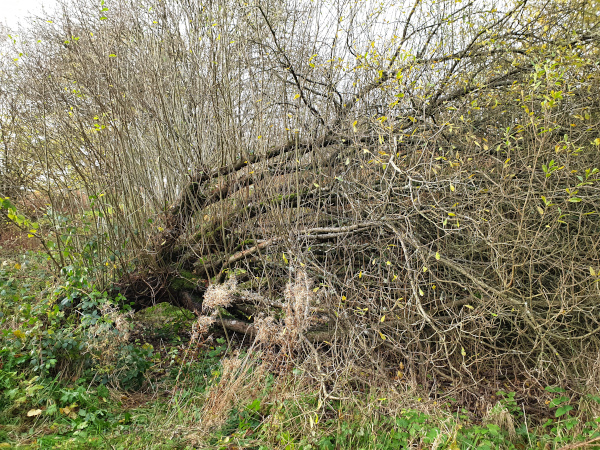
Goat willow in the woodland (salix caprea)
There’s an old goat willow in the woodland, it has fallen over and thrown up some nice long straight stems from its, now, horizontal branches. It is scheduled for replacement with some, much more attractive, coloured bark willows but this year I wanted to see if I could make a wreath from it.
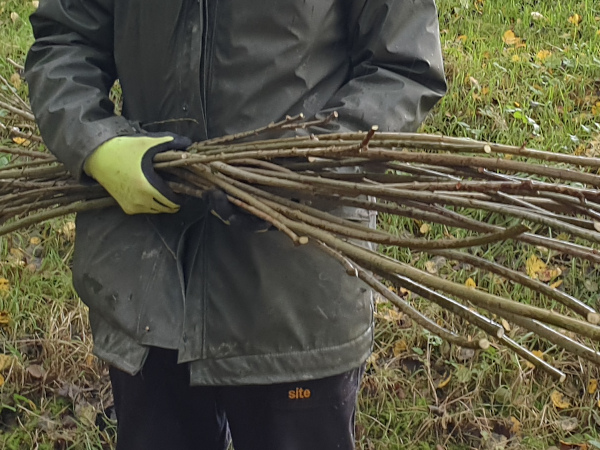
Bundle of Willow Withies
I had a bit of help cutting them down.
I was aiming for pencil thick whips to make them flexible enough for weaving. We cut about twenty stems around 4ft to 5ft (120cm to 150cm) in length.
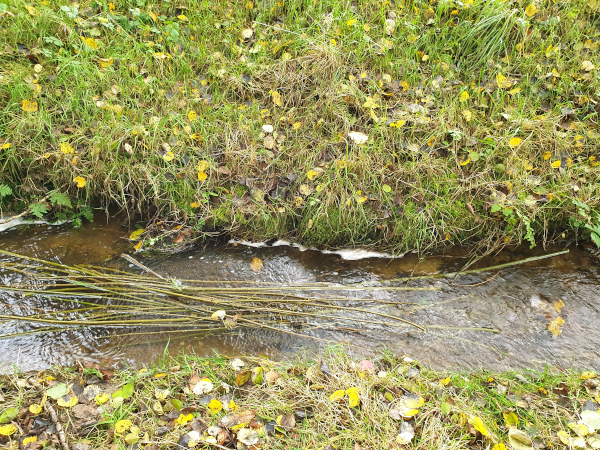
Willow withies placed in the stream to soften
Some of the stems were thick and inflexible. We soaked them in the stream, that runs through the garden, to try and soften them.
We left them there for about a week, working on a rule that I learned at a willow basket making class; one day soaking for every foot of willow. I gave it the extra days just to make sure, and because the weather was too bad to go and fish them out.

Completed Willow Wreath
I wanted the wreath base to be large, at least 60cm diameter. I tied two of the lengths together and joined them into a circle, then I wove the rest of the stems around the circle one at a time.
The larger size base made it unwieldy and I needed a bit of help holding the base while I wove around the willow stems.
It didn't end up quite as round as I had envisaged, but some of those withies have a mind of their own. I left it to dry for around two weeks.
Once dry I attached a length of string to the back to allow me to hang it on the wall. It's much easier to add the hanger at this stage than when the wreath is covered in flowers.

Dried Flower Bundle
I have been collecting flowers for drying all summer. I hang them up on strings on the landing, which, as I live in an old stone cottage, is dark and protected from the sun. Drying flowers in the sun will make the colours fade.
I started the wreath by making small bunches of dried flowers, containing different shapes and colours, fastened with garden twine.
I attached a roll of green florists wire to the back of the wreath. I laid the wreath face up on the table, with the attached roll of wire next to it. I then placed bunches of dried flowers on top until I was happy with the way it looked.
Once I liked what I saw I brought the wire over the first bunch, took it under the wreath and to the front again, like winding cotton on a cotton reel. I took the wire over each bunch in turn, making sure that the flowers in each bunch covered the stems of the bunch behind. You may have to take the bunches off the wreath while you do this and lay them in the correct order around the outside of the wreath.
When I want to change the flowers next year, I will unwind the wire, put the flowers in the compost bin, complete with twine ,and use the same wire to attach a fresh set of flowers. Very sustainable.

Wreath Detail:
This is a close up of one of the sections of the wreath. It contains, from left to right, Millet (Panicum miliaceum violaceum), Drumstick Scabious (Scabiousa stellata), Quaking Grass (Briza maxima), the grass Frosted Explosion (Panicum elegans), Hare’s Tail grass (Lagurus ovatus), Statice Apricot Beauty (Limonium sinuatum), Straw Fower (Helichrysum braceatum) and Pink Pokers (Limonium suworowii). All were very easy to dry hanging upside down in a cool place out of direct sunlight.
Note: Drumstick scabious is a lovely shape but the seeds seem to fall off really easily, it wouldn’t be tough enough to use in a dried flower crown.
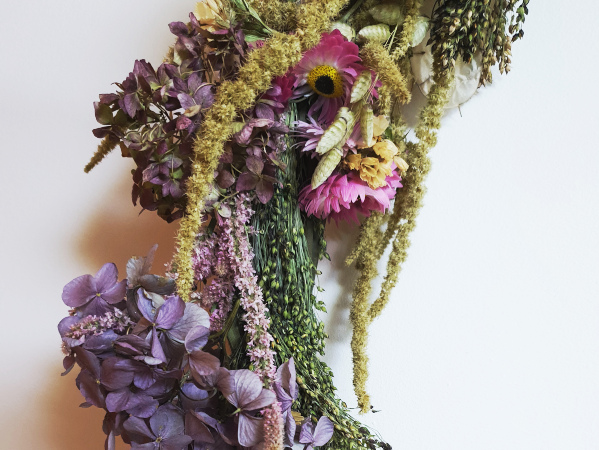
Wreath Detail: Amaranth
Another bit of wreath detail. The long dangly, yellow-green, flower is amaranth (Amaranthus caudatus Viridis), when I grew it this year I was stumped as to what to do with it. It looked jolly with the dahlias but seemed quite unwieldy in a vase. Drying made it lovely. I wish I’d dried more. I’ve since found out that I should have pinched out the centre stem to encourage side branching. I’ve made a note for next year.
The pink flower is Helipterum roseum Goliath Rose Red or Acroclinium Double Giant Flowered Mixed, they both seemed the same to me.
At the bottom of the photo is a dried hydrangea. I love hydrangeas but I have been told by the people who lived here before us that you can’t grow hydrangeas on this cold hillside. These were grown in pots. Next year I am going to try planting some out in the garden, in front of a hedge for shelter. Finger’s crossed they survive; they are one of my favourite shrubs.

Wreath Detail:
This section has poppy seed heads, more quaking grass and Frosted Explosion, dark blue lavender and honesty seed heads.
The fluffy grass at the bottom is Pennisetum villosum (Chinese Fountain Grass), grown from seed this year.
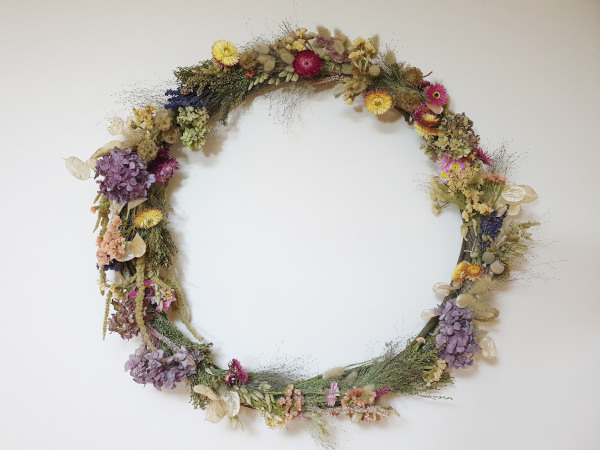
Dried Flower Wreath on Wall
The finished wreath hanging on the wall. I love it. It's a reminder of summer in the depths of winter.
Other Blogs
- The Start of the Journey (18th August 2019)
- The Making of a Flower Farm (14th May 2020)
- Hoglets and other Wildlife (22nd June 2020)
- Polytunnel Preparation (15th October 2020)
- Building a Polytunnel on a Slope (14th November 2020)
- Making a Dried Flower Wreath (18th December 2020)
- Sowing Sweet Peas (27th December 2020)
- Organising Seeds (2nd March 2021)
- In Love with the Lent Lily (20th March 2021)
- Tulip Exotic Emperor (25th April 2021)
- Keeping Snapdragons Straight (9th September 2021)

